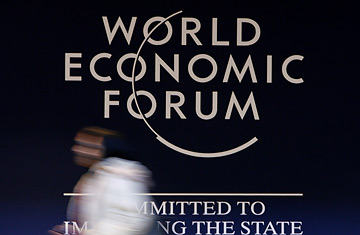
The World Economic Forum in Davos, Switzerland, begins on January 23, 2008.
A decade ago, Davos was the most coveted invitation among the aspirants, wannabes and star-struck hangers-on of the world's power players. The annual shindig of the World Economic Forum in the Swiss Alpine ski resort assembled the corporate and political elites of the West — and those from the developing and former socialist worlds who were ready to accept their tutelage — to plot the future of globalization. The free market had become the uncontested economic model, free trade was the order of the day and dot-com visionaries promised that stock market exuberance was no longer irrational. The future seemed to belong to what Samuel Huntington (yes, he of the "Clash of Civilizations" fame) dubbed "Davos Man."
The fact that this year's gathering opened under the cloud of a precipitous global stock market slide and creeping recession may be symbolically apt, but it is not the only reason for the absence of triumphalist illusions at Davos 2008. The markets are telling us that the U.S. economy, and all whose wagons are hitched to it, are in for some very nasty times whose depth and duration nobody can predict. And the stalled global talks on extending free trade (the "Doha Round," which began seven years ago and remains unfinished) are a further sign that faith in free markets has its limits. But even outside of his immediate economic woes, it has become increasingly clear that Davos Man's authority is in decline.
The choice of the event's opening speaker and one of its co-chairs — respectively, Secretary of State Condoleezza Rice and former British Prime Minister Tony Blair — suggests that Davos Man is either out of touch, or else in a state of melancholic denial. For one thing, Rice and Blair arguably bear substantial personal responsibility for the catastrophic policies that have exacerbated the violent chaos spanning an "arc of instability" from Palestine to Pakistan. Their track record alone suggests that neither has much new, or interesting, to offer in a discussion about managing an increasingly dangerous world.
Track record aside, though, neither Rice nor Blair is a significant player going forward. Blair lost his leadership of Britain precisely because of his foreign policy choices, and is now confined to a role on the margins of a Middle East peace process that has the proverbial snowball's chance in hell of succeeding — and even then, he serves at the pleasure of a U.S. Administration whose lame-duck status is quickly rendering it largely irrelevant on the global stage.
Rice's recent tour of the Middle East along with President Bush confirmed that, politeness aside, Washington is now being substantially ignored by both friend and foe in that troubled region. Neither the Israelis nor the Palestinians, Saudis, Syrians and Iranians appear to set any store by the threats, promises and prescriptions of Washington. Israeli Prime Minister Olmert may flatter Bush with exaggerated praise, but he's not heeding the Administration on the question of settlements. The Saudis may shower Bush with bling, but they also firmly rebuff any suggestion that they should be isolating Hamas or Iran. And so on.
The decline of Davos Man is not simply related to a credit crunch or a U.S. election year. Even if America elects a new Administration dedicated to reversing the mistakes of the Bush team, it is unlikely to restore U.S. and Western primacy such as it existed in the golden years of Davos. The policy failures of the Bush years may have accelerated the decline of U.S. influence, but they are not its sole cause. In the years during which the U.S. became distracted by the "global war on terror," China's economy has grown to twice the size it was when President Bush first took office. It is to China — guarantor, by virtue of the trillion dollars and growing line of credit it makes available to the American consumer, of the American way of life — that U.S. investment banks turn for help when confronted by their losses in the subprime loan crisis. The very success of capitalism in developing and former socialist countries has inevitably weakened the grip of the West on the global political economy.
Today, market analysts contemplate whether the best hope for the global economy avoiding being dragged into the vortex of recession by the U.S . slowdown may be the "decoupling" from the U.S. economy that some believe could allow economies such as China and India to continue growing by virtue of momentum in their own economies. It's a theory, untested in crisis — and clearly the wobbles hitting India's stock market this week suggest its own investors are not convinced. Still, China has already become the key trading and investment partner in both Africa and in some key Latin American countries, offering a model of development quite different from the "Washington consensus" on issues of governance and economic management that might, as easily, have been dubbed the "Davos consensus." China is certainly not going to take direction from its debtors, and global energy prices have transformed Russia from obedient supplicant to swaggering challenger to the West.
The U.S. and its allies remain immensely powerful, but the limits of their ability to influence events have been laid bare in Iraq. Today, long-term traditional U.S. allies in Asia, Africa, Latin America, the Middle East and Europe can no longer be counted on to follow Washington's lead. At the same time, the Davos crowd has lost its near-monopoly on global political and economic power, which is increasingly being diffused across a variety of different power centers with shifting alliances. French foreign policy intellectuals of the 1990s, fearful of what they called the American "hyperpower," fantasized about a "multipolar world" where power was balanced across a variety of different power centers and interests. While economic "decoupling" remains an untested hypothesis, geopolitical "multipolarity" is today increasingly plain to see. And nowhere more so than at Davos.
